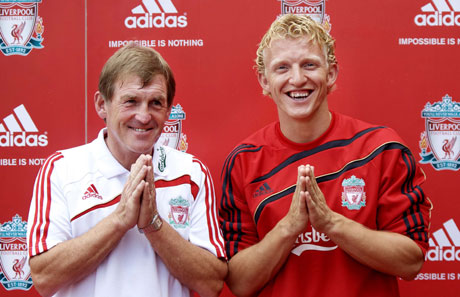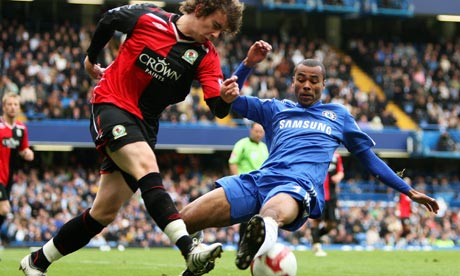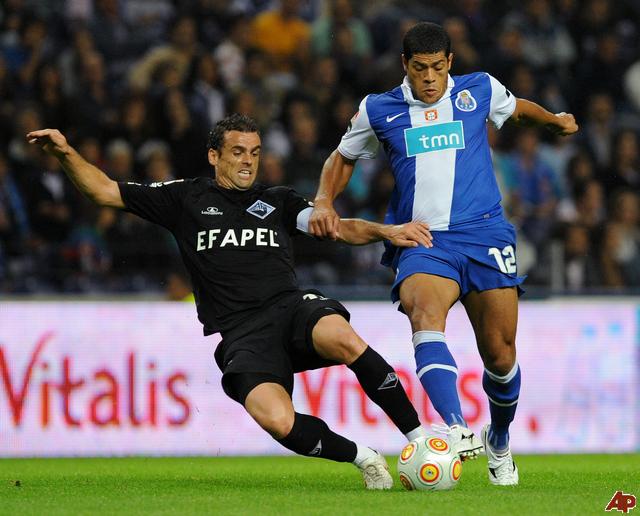-
Recent Articles
Understanding the 4-4-2 Diamond
DEFENCE Despite the fact that there are four ways to play a diamond formation on FM, the differences between them are few and usually subtle. As a starting point, one thing each of them do have...3 at the back and the 4-4-2 Diamond
 Last week Chelsea v Liverpool became the biggest tactical talking point of the season. Liverpool revived the the 3 man defence that Kenny debuted against Stoke. While with the introduction of Torres for £50m...
Last week Chelsea v Liverpool became the biggest tactical talking point of the season. Liverpool revived the the 3 man defence that Kenny debuted against Stoke. While with the introduction of Torres for £50m...How To Set Up A Back Four
 Last year, I wrote a guide about how to play a simple 4-4-2. One of the major components of that is the back four. In fact, most modern formations build upon four defenders; two full backs and two centre...
Last year, I wrote a guide about how to play a simple 4-4-2. One of the major components of that is the back four. In fact, most modern formations build upon four defenders; two full backs and two centre...Building Your Defence: Full Backs
 The modern full back is quickly becoming one of the most important players on the team sheet, infact even back in the days of Brian Clough, fat ed' argued that because of the space these players get in the final...
The modern full back is quickly becoming one of the most important players on the team sheet, infact even back in the days of Brian Clough, fat ed' argued that because of the space these players get in the final...False Nine Tactics
 When we think about modern football trends, we think about the fall of the 4-4-2, the introduction of inverted wingers and the rise of the 4-5-1. But there is one other tactical rise that seems to have...
When we think about modern football trends, we think about the fall of the 4-4-2, the introduction of inverted wingers and the rise of the 4-5-1. But there is one other tactical rise that seems to have...
JOIN 19,215 READERS - SUBSCRIBE NOW TO OUR FOOTBALL MANAGER NEWSLETTER
Get the latest FM news & best community content delivered directly to your e-mail inbox!
Tactical Bible ’08: Squad Management IV: Team Talks & Individual Talks
Written by: Matt vom Brocke
Category: Management
Posted on: May 4, 2008
May 4, 2008
Squad Management IV: Team Talks and Individual Talks
A short reference guide
Revision one - February 2008
Team talks are a key to influence your team’s performance and to give you a good start into the game. The half-time team talks have even more impact on the final score and often decide whether you are giving away a comfortable lead or turning around a game if needed. Some players claim that they have fantastic assistant managers who do this perfectly, but in most cases these team talks are rather lousy if you look them up using the team talk feedback, even if the values for motivation and man handling are very high.
There is a new option available for FM 08 which will make things easier for you if you do not have much experience with giving team talks: the Ask Assistant button. This is especially helpful for selecting individual options for the new performance based talks since it will remind you to spur those individually which can be easily forgotten from match to match. However, you will still see that the AI standard choice is ‘for the fans’ and picked by far too frequently at start of the game. You can do it better! So, as a tip: select ‘Ask Assistant’ to single out some of the individual comments based on performance (not all are selected, again), but then select your overall team talk for the remaining squad. Please note that the quality of both individual and team recommendations given by your assistant differs strongly depending on his man management and motivating abilities.
Since team talks are covered in detail in part II and III of Communication and Psychological ‘Warfare’ 08, we will only present bullet-points of the options available here.
Pre-match team talks
- Tell the players they can win this game. Probably a good choice for most home games in which you are favourite, also if odds are in your favour for away games and you feel this is a realistic view of your team in contrast to over-hyped odds due to a good run.
You will soon see that this can become your standard team talk easily once you managed to assemble a combination of solid tactics, a gelled squad and consistent performances. In fact, despite the advice to vary team-talks given by the in-game hints, there is not too much room for variations if you have reached this state of stable performance. Don’t hesitate to use it then and vary on rare occasions plus vary individual talks in this situation. - Wish the team luck for the match ahead. This should be your choice for away games or home games where odds are clearly against you. The message is simple: you do not have to win today, I already would be happy with one point. So you should not be too angry if you will not get more, but your team may be much more relaxed and eventually get a result.
- Tell the players you expect them to win the match. A clear and simple statement, and it will be understood as is. However, this can make your players buckle and succumb to the pressure. It can be helpful under these circumstances: you are clear favourite for the match and you do have a very determined, ambitious and professional squad. You will see that these kinds of squads often will react very positive and delighted if you put things clear. If you are lacking these kinds of players and a clear situation for the match, you should stay off from this choice.
- Tell the players to do this for the supporters. For some strange reason the default assistant choice. But this should be reserved for the rather few games (depending on your league) against fierce rivals and occasionally for cup finals (get the trophy for the fans!). Always add individual talks.
- Tell the players there is no pressure on them today. An option if wish luck seems to be too much. In other words, if you expect your team to lose anyway or to face one of the hardest games of the season, no matter if you manage a top team or a relegation candidate. Combine this with encouraging individual talks to all key players. Also, this is the most valuable team talk if your team is in a crisis and lost its winning form for several games and now will play a seemingly small opponent at home. More then once I have seen a team recovering using this route. It seems to work equally well for highly determined squads, which have started to dominate a league at will and have several leading members with high influence and determination on the field.
Half-time team talks
-
- Show your anger at the team/I expect nothing else then a win. You are behind or drawing a game which you should clearly win without any doubt. Change formations, bring on a new player and combine with individual talks and you should see a different second half. Most likely you will be hailed by your players for turning around this game if you should succeed.
- Disappointed/I want to see more from you. You are behind away, but you do not clearly see that a win is a must, you are draw against a quite good team at home or you are leading with a big team but only by one goal and the game is far away from being safe for you side, and the number of chances created is too low. Demand more any you may get it.
- You can win today. Encourage your players in a positive way. Use this route if Angry/Disappointed may be too harsh since you are playing strong teams, if you still surprisingly hold a draw away without being favourite and think you have potential to win. Also, this is the way to go if you would have preferred angry/disappointed but your team has low morale,
- Sympathize. The way to go if you unlucky behind or drawing, but see a good performance.
- Pleased. For sustaining a good, at least two goals lead against a good opponent.
- Show encouragement to the team (if available). If you are leading closely against strong opponents but your team is playing well and should maintain the performance to win.
- Don’t let your performance drop (if available). If you are leading closely and feel your team is in control and dominating but has to stay focused to keep the lead.
- Pleased at the performance (if available). Shows this: your are outplaying them everywhere! If you dominate from first to last, but missed to score yet, just scored once and all you need is more luck with finishing.
- Thrilled. For a clear cut lead of three goals at half time, or a good lead away, or leading against a very strong opponent. Whenever your teams performs above themselves (even if they do it every week).
- For the fans. See pre-match. Only for fierce rivals or cup finals.
- Go out and enjoy the rest of the game/The pressure is off! For friendlies, if there is not much left to win, if you are already clearly behind and playing a team which is also clearly better then your own team and expecting to turn around will be asking for too much.
Post-Match Team Talks
The shortest and least important part of all, since most time your players don’t listen anyway! The only bad mistake is not to give enough praise after good performances, and your players will let you know if this happens. If you are up to, you can acknowledge key performances and single out bad performances. Youngsters and new players tend to listen more often and will be happy if you praise them. Have a look at individual morale and praise those who are still in bad mood after a win.
Individual Player Talks
Individual player talks can be the dot on the ‘I’. Use them wisely and check the assistant feedback to find out how your players react. It depends on their individual personality again. As mentioned earlier, you can use the ‘Ask Assistant’ button to select comfortably some individual talks, which is especially helpful regarding a new feature in FM 08: the individual talks to players based on their previous performances.
Pre-match talks
- Having faith. Still the most useful option at start of a match, since most players will act very favourable, especially if they have been on low morale or if you apply this to your key players before a very important match. I often had the impression that it works like adding some extra composure points to your attacking players.
- No pressure. It may help your youngsters through their first senior team performances, but also and especially new players who still have to link up with their squad, additionally it can be helpful for players during their first games if they are returning from a long injury. There are some signs it can help for players with low morale, but there are more test feedbacks needed.
- Expect a performance. Formerly a useful option for players after a series of bad performances, best combined with according media feedbacks, but now it does look rather obsolete since you will be able to give performance based feedbacks. Maybe it still can be applied for key players who did not achieve anything better then something like a 7-7-6-7-7 form. Will also need some testing.
Performance-based player talks
- Expect better. Only available after a performance below 6 in his last match, and it will be most likely only helpful if morale is not too low now. Further long-term results needed to judge how efficient this talk is.
- Pick up where you left off! This option is only available after a performance above 7 in the last match. Should be applied if the player has a good morale or better.
Most likely you should only give these performance-based talks to players with at least good morale to apply them efficiently. If possible, you should make sure that your players would go into these matches having good morale. If not, you should better stick to the ‘have faith’ talk which has proven its worth as something like a ‘killer’ talk due to the enormous morale boost it can give.
Half-time talks
Similar to overall team talks, take your time on these since these are the talks that can change things and make the difference.
- Angry. This will only be helpful if the player is under-performing but still has a very good morale.
- Disappointed. As above, but less harsh and again rarely morale boosting. Use both talks only for very professional, determined key players if they have good morale and are clearly performing below their standards.
- Having Faith. Just the same as in pre-match talks, this is usually the best morale boosting talk. Especially watch out for players who are behind the team morale when already winning. It can help to increase confidence and performance for the second half.
- Pleased. Can result in sustaining an already good, but not brilliant performance. Most players will react favourable.
- Delighted. The same as please for a brilliant performance. Often will result in a morale boost
- No pressure. As in pre-match, a good option if you sub in the same kind of players, be it youngsters, new players or players coming back from an injury. You can additionally confirm this during half-time, if performance during the first half was not brilliant.
- Prove a point. Only available if you are behind at half time. Similar to a killer talk for players who are far away from their standard.
- You can make the difference! The ‘Have Faith’ talk for a team being behind at half-time. Very often the best option in combination with ‘Prove a point’ and a good team talk.
Post-match talks
As for team-talks, probably the least important part and you can give some individual feedbacks, if you are up to. Look for new players and youngsters first, additionally for those with bad morale despite winning or those who played well despite losing. Check your team talk feedback frequently to find out how your players react since everyone is different and needs and individual handling.
Helpful Links
Communication and Psychological ‘Warfare’ 08 (CPW) - Full version
Communication & Psychological ‘Warfare’ 08 (CPW) – Compact
Tactical Bible Credits
Revision: crazy gra, Millie, JP, wwfan, Abramovic, Asmodeus. Written by the next Diaby. Please refer to extended credits in CPW 08.
First version: crazy gra, Millie, wwfan, The next Diaby. Proof-reading: Millie
About The Author: Matt vom Brocke
Matt’s contribution to FM-B as a whole and the tactical area in particular cannot be over-estimated. The writer of the very well-recieved Communication and Psychological Warfare and Creativo set of tactics, Matt is a key member of the Tactical Think Tank and part of SI’s beta testing Dream Team.
Download Our Tactical Theorems '10 eBook Absolutely Free

Presenting the most comprehensive tactic design and match strategy guide to the Football Manager series ever created!
Written by FM match engine beta testers, it's 60+ pages of easy-to-read concepts and ideologies for getting your team playing exactly how you want each match! It's been downloaded over 100,000+ times to date!
Find out more information about our tactical eBook
and download Tactical Theorems '10 right now!
Written by FM match engine beta testers, it's 60+ pages of easy-to-read concepts and ideologies for getting your team playing exactly how you want each match! It's been downloaded over 100,000+ times to date!
and download Tactical Theorems '10 right now!
Web discoveries
- UK Casinos Not On Gamstop
- Online Casinos UK
- Best Slot Sites
- Non Gamstop Casinos
- Casino Sites Not On Gamstop
- UK Online Casinos Not On Gamstop
- Slots Not On Gamstop
- Non Gamstop Casino UK
- Non Gamstop Casino UK
- Casino Sites Not On Gamstop
- UK Online Casinos Not On Gamstop
- Casinos Not On Gamstop
- Gambling Sites Not On Gamstop
- Non Gamstop Casinos
- Non Gamstop Casinos
- Non Gamstop Casino UK
- UK Casino Not On Gamstop
- Casino Sites Not On Gamstop
- UK Online Casinos Not On Gamstop
- UK Online Casinos Not On Gamstop
- Brand New Casinos Not Blocked By Gamstop



